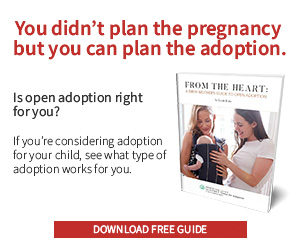When a woman making an adoption plan matches with a couple hoping to adopt, there are many emotions involved–excitement, fear, anticipation, and dare I say a little awkwardness? Navigating the time between matching and placement day can be a little tricky. It’s difficult when there are so many conflicting feelings going on. Trying to build a relationship with the other set of parents on top of that can get overwhelming very quickly. The time between matching and placement can be compared to courtship before marriage–you are about to make a lifelong commitment, after all. Here are some common questions I run across while working with both hopeful adoptive and expectant parents, and some tips to help get you started.
Are you considering placing a child for adoption? Not sure what to do next? First, know that you are not alone. Visit Adoption.org or call 1-800-ADOPT-98 to speak to one of our Options Counselors to get compassionate, nonjudgmental support. We are here to assist you in any way we can.







